Fuel crisis: Police officers oversee queues at fuel stations
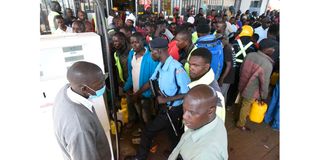
A policeman controls people fueling at one of the few petrol stations in Eldoret town, Uasin Gishu County that had the precious commodity on April 04, 2022.
Police have been deployed to fuel stations in Eldoret to maintain order as motorists scramble for the little available fuel amid a shortage.
The Nation observed armed police officers guiding queues stretching several kilometres.
It is a ticking time bomb, as some buyers come with jerricans and other containers after their vehicles stalled on roads, oblivious of the hazard that this presents.
“It is a crisis that has never been witnessed before and we have asked the police to help us manage the huge crowds as well as vehicles,” said Mr George Kiplimo, a petroleum dealer.
“Our staff are overwhelmed managing the queues because everyone wants to be served before the available fuel runs out. The situation is dire, considering the delicate products we are handling.”
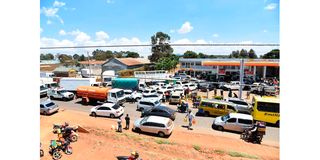
Motorists queue for fuel at a petrol station at Rock Centre in Eldoret, Uasin Gishu County on Tuesday April 5, 2022.
Public safety concerns
Uasin Gishu County Police Commander Ayub Ali Gitonga said on Monday officers had been deployed to control human and vehicle traffic because of public safety concerns related to the products.
"Dealers have reached out to us because they are overwhelmed by the surging crowds. (Even at stations that have not requested our help), we send police officers to control crowds because we foresee ugly scenes at the petrol stations," said Mr Gitonga.
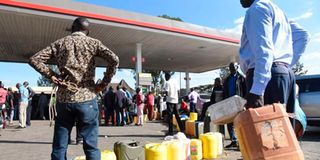
People queuing with jerrycans at a petrol station in Eldoret town, Uasin Gishu County that had the precious commodity on Monday April 04, 2022.
He said a majority of consumers now carry petrol around with containers, which is risky.
Apart from guarding fuel stations, police are also carrying out safety awareness for those ferrying fuel in jerricans.
Traffic police are also managing heavy traffic stretching from main highways to petrol stations.
Consumers from as far away as Baringo, Trans Nzoia, Nandi, Elgeyo Marakwet and even Nakuru counties have been flocking to Eldoret with the hope of finding fuel, with many spending nights lining up at stations.
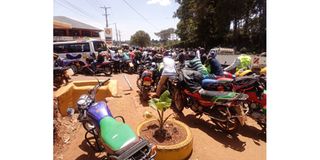
Congestion at a Shell petrol station along the Kapsabet-Kaimosi highway in Nandi county on Monday, April 4, 2022.
GK vehicles given priority
In Nandi County, stations that received fuel on Saturday were giving priority to clients with official contracts with them.
Government vehicles and ambulances and vehicles owned by security officials and firms are also being given priority.
Travellers were left stranded in most towns in the North Rift region as the fuel crisis persists.
The Nation established that fares have nearly doubled on various routes.
Matatu operators are charging up to Sh1,700 from Eldoret to Nairobi, up from between Sh900 and Sh1,000. Most private vehicles are charging Sh1,500 and Sh1,700 on the same route.
On Monday, there were long queues at terminuses in Eldoret as travellers sought public transport to destinations across the country.

A usually busy street in Eldoret town, Uasin Gishu County with empty parking spaces on Tuesday April 05, 2022 as motorists kept away from the roads due to the current fuel crisis.
Some operators have also withdrawn their vehicles from roads because they could not find fuel.
Mr Peter Wanjala, a traveller, told the Nation that he came to the bus stage at 5am and had been stranded for more than five hours.
“I woke up very early in the morning but I have not been able to get a vehicle despite booking at 6am. We hope that the government will intervene and find a solution to this fuel crisis,” he said.
There has been a shortage of fuel in Eldoret, Uasin Gishu, and neighbouring counties for about two weeks.
Nights in the cold
Some motorists had spent nights in long queues at fuel stations.
“I have not been able to get the fuel despite spending a night at this station. I might not be able to work on Monday,” explained Paul Kipchumba, a matatu driver in Eldoret.
Mr John Agaga, the Nandi County secretary of the Kenya Union of Civil Servants, said many workers had left their vehicles at home and used public means to get to work.
He urged the government to intervene and end the fuel crisis.
Fuel shortages have been reported across the country since Wednesday last week, threatening to cripple the public transport sector.
Independent petroleum dealers last Wednesday warned that the crisis would persist until the government assures shippers of compensation for landed fuel, which costs over Sh164 a litre.
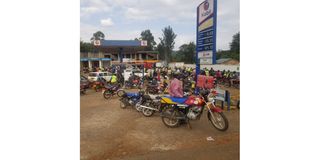
A congestion of bodaboda riders at Webuye Kobil fuel station on Tuesday April 5, 2022.
Bungoma riders
In Bungoma, where the shortage entered the 10th day on Monday, bodaboda riders asked President Uhuru Kenyatta to stop engaging in petty politics and resolve the fuel crisis.
The irate riders said they were shocked to see the President address a public rally on Sunday in Pipeline estate, Nairobi, and dwelling on “inconsequential political issues” instead of addressing matters of national concern like the fuel shortage.
Mr Moses Wanjala, a bodaboda rider in Bungoma town, said riders were the most affected.
"This sector employs many youths who wake up very early in the morning to fend for their families, but with this ongoing crisis, life has become unbearable,” he said.
He said many riders have spent nights in the cold at fuel stations hoping to get the precious commodity.
"Some of the fuel dealers have even refused to sell us fuel for more than Sh500, while others don't sell the product in jerricans or any container," he lamented.
He added that some fuel stations had also hiked prices, selling it for Sh260 a litre from the normal Sh135.
Mr Amos Wanyama, another rider, said those who bought their motorcycles with loans have been under pressure to pay their daily remittances.
Motorists in Bungoma were flocking to the Malaba border point to buy fuel in Uganda.
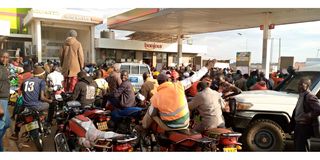
Motorists queue for fuel at Total fuel station in Kapenguria, West Pokot County on Tuesday, April 5, 2022.
West Pokot
In West Pokot County, many fuel stations remained deserted after running dry, with many operators withdrawing their vehicles from roads, including taxi operators.
The few stations that still had some fuel were congested.
“There was nothing my vehicle was doing on the road. I could not continue working at a loss,” said Mr James Perimo, a taxi operator.
Mr Charles Kibet, another taxi driver, lamented: “Things are now getting out of hand and we are unable to move. We need to know what the problem is. I have not worked for the last two days.”
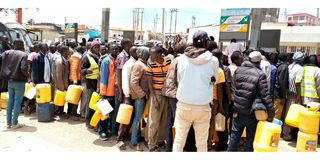
Motorists queue for fuel at Total fuel station in Kapenguria, West Pokot county on April 5, 2022.
On Friday, the Energy and Petroleum Regulatory Authority (Epra) said Kenya has 80,766 cubic metres of petrol – enough to last nine days – and 217,570 cubic metres of diesel, sufficient for 22 days.
The Kenya Pipeline Company (KPC), the state entity that is supposed to ensure there is a steady supply of fuel, on Saturday said there were enough fuel stocks and that ships were waiting in Mombasa to unload more supplies.
By FRED KIBOR, STANLEY KIMUGE, TOM MATOKE, BRIAN OJAMAA and OSCAR KAKAI





